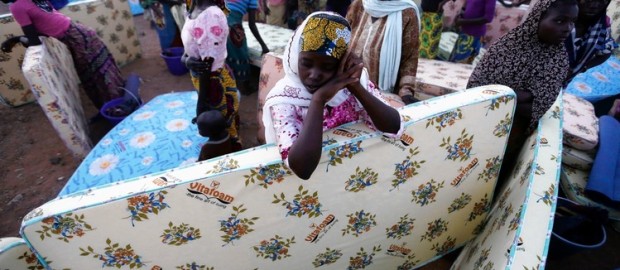Voting Rights of Numerous Displaced Nigerians Unsure – Lawmakers fight so the roughly 1.5 million Nigerians residing in refugee camps throughout the country have got a voice in the forthcoming federal elections.
More than a million Nigerians are internally displaced due to insurgency fighting in the northern part of the country, while some fear that their votes will not be counted in the upcoming 2015 general elections.
On Tuesday, the Nigerian Senate urged the Independent National Electoral Commission (INEC) to do all that is in their administrative power to ensure that Internally Displaced Persons (IDP) could vote in the elections.
According to figures released by the United Nations agency for refugees (UNHCR) this week, the number of IDP in Nigeria has reached 1.5 million, mainly due to the rise of Boko Haram militants.
The extremist group has stepped up attacks this year and declared an Islamic state in areas it controls, mainly in the north of the country.
Current President Goodluck Jonathan has imposed a state of emergency in the northeastern states of Adamawa, Borno and Yobe, where the militants have been the most active.
In the central state of Nasarawa, there are more than 10 refugee camps set up for IDP, where conditions are rapidly deteriorating. It is people who live in these camps – who are largely living off of government aid, and are dependent on the government’s ability to stop Boko Haram militants – who lawmakers want to ensure have a vote in the federal elections.
Prior to the senate’s plea to INEC, lawmakers presented a bill to officially amend electoral laws. The changes would include a provision for the establishment of special polling units for IDP, and empowers the electoral commission to ensure that all who qualify are made to cast their votes at elections.
Jonathan, and the ruling People’s Democratic Party (PDP), is up against ex-military leader Muhammadu Buhari from the All Progressives Congress (APC) party for the February elections.
Jonathan, who was elected President in 2010, has recently been highly criticized by Nigerians for not being able to control the Boko Haram militants from terrorizing the country. However, according to NOI Polls (a West African polling service) for the month of November he still showed a 60 percent approval rating.
Buhari was appointed military leader of the country in 1983 (until 1985) after a military-coup that overthrew then President Shehu Shagari. The ex-military officer has also been criticized by Nigerians for committing various human rights abuses during his time in power, according to the Nigerian Daily Post.
For more subscribe to our channel:
https://www.hopefornigeriaonline.com/youtube









